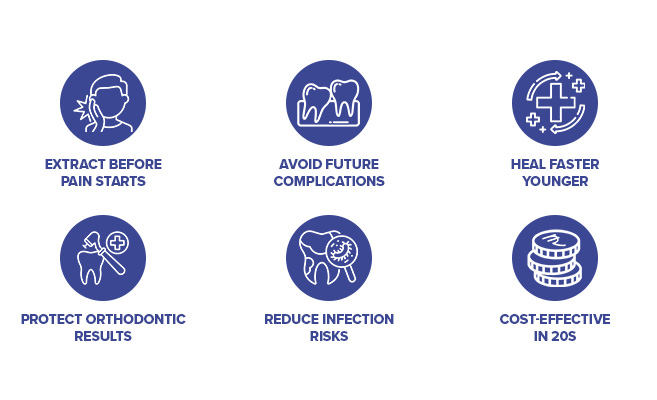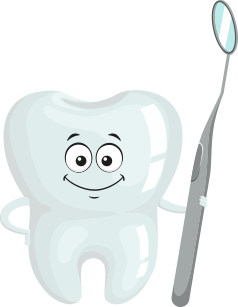The Benefits of Wisdom Tooth Extraction in Your 20s

You’re in your 20s — vibrant, active, and likely focused on career, relationships, and personal goals. The last thing on your mind might be your wisdom teeth. Yet these last molars, often called the “third molars,” can silently cause problems that disrupt your dental health — and overall wellbeing.
Many underestimate how critical this decade is for managing wisdom teeth effectively. Ignoring them until pain strikes can lead to complicated procedures, infections, or even damage to other teeth.
Removing wisdom teeth in your 20s is widely regarded as a proactive step to avoid these challenges. Early extraction offers benefits beyond immediate pain relief — it safeguards your long-term oral health, supports orthodontic work, and reduces recovery time.
This blog will unpack why the 20s are the ideal window for wisdom tooth removal in chennai, explain the extraction process, cover costs, and debunk common myths — arming you with the knowledge to make smart dental decisions.
Why Are Wisdom Teeth a Problem?
Wisdom teeth usually emerge between ages 17 and 25, when your jaw is fully or nearly fully developed. While some lucky individuals have enough space to accommodate these molars, many face complications due to limited space or improper alignment.
Common issues caused by wisdom teeth include:
- Impacted teeth: When wisdom teeth are trapped beneath the gumline or grow at odd angles, they can cause pressure, pain, and infection.
- Crowding or shifting of existing teeth: Wisdom teeth can push adjacent teeth out of alignment, compromising prior orthodontic work or natural spacing.
- Infections and cysts: Impacted wisdom teeth can trap food and bacteria, leading to infections, gum inflammation, and cyst formation around the tooth.
- Gum inflammation and disease: Difficulty cleaning wisdom teeth areas increases risk of gum disease, which can affect surrounding teeth and bone.
- Tooth decay: Wisdom teeth are harder to clean properly, raising the chances of cavities both in themselves and neighboring molars.
Ignoring these problems risks escalating discomfort and complex treatments. Proactively managing wisdom teeth during your 20s can prevent these issues before they start.

Top Benefits of Wisdom Tooth Extraction in Your 20s
1. Prevention of Pain and Discomfort
One of the most immediate and tangible benefits of wisdom tooth extraction is pain relief — or better yet, pain prevention. As wisdom teeth emerge or become impacted, pressure on other teeth and swelling can cause sharp or persistent pain. Early extraction eliminates this source of discomfort, often before you notice symptoms.
2. Avoid Future Complications
Early removal helps avoid serious problems down the line, such as:
- Damage to adjacent teeth caused by pressure or infection
- Development of cysts or tumors in the jawbone
- Sinus issues from upper wisdom teeth pressing against sinus cavities
- Gum and bone infections that may require extensive treatment
By acting early, you reduce the likelihood of complex surgeries or extended healing periods later in life.
3. Faster Healing and Recovery
Younger adults heal more quickly and experience fewer complications than older patients. Wisdom tooth extraction in your 20s typically involves shorter surgery times, minimal swelling, and a faster return to normal activities — sometimes within a week. Waiting until your 30s or 40s can mean slower recovery and higher risks.
4. Better Orthodontic Outcomes
If you’ve invested in orthodontic treatments such as braces or aligners, wisdom teeth can threaten your progress. They may cause teeth to shift or crowd once again. Extracting them early helps maintain your ideal alignment, preserving your smile for years to come.
5. Reduced Risk of Infections and Oral Disease
Impacted wisdom teeth create pockets where bacteria thrive, increasing risks for:
- Gum disease, which can affect your overall oral health
- Cavities not only on the wisdom tooth but neighboring teeth
- Chronic bad breath (halitosis) due to bacterial build-up
Early removal cuts off these infection sources and promotes a healthier mouth.
Why Your 20s is the Ideal Time for Wisdom Tooth Removal?
Timing your wisdom tooth extraction is crucial. The roots of wisdom teeth are not fully formed in your late teens and early 20s, which makes removal easier and less traumatic. The bone surrounding the teeth is also less dense, allowing for quicker healing.
Dentists often recommend extraction even if symptoms haven’t appeared yet. This preventative approach is especially useful because:
- Symptoms often develop only after damage has already begun
- Extraction before full root formation reduces risk of nerve injury
- Recovery is less painful and faster at this stage
Delaying extraction might result in harder surgery and longer healing times.
What to Expect During Wisdom Tooth Extraction?
Initial Evaluation
Your dental surgeon will begin with a comprehensive exam including X-rays or 3D imaging to:
- Evaluate tooth position and impaction
- Identify root formation and proximity to nerves
- Assess any existing infection or bone damage
This evaluation helps plan a safe and effective extraction.
The Procedure
- Most extractions are done under local anesthesia, sometimes with sedation or general anesthesia based on case complexity and patient comfort.
- Simple extractions involve loosening the tooth and removing it whole. Impacted teeth may require small incisions and bone removal before extraction.
- The procedure usually takes 30 minutes to an hour depending on difficulty.
Recovery
- After surgery, ice packs and rest help reduce swelling.
- Pain relief medications and antibiotics may be prescribed to prevent infection.
- Most people return to normal daily activities within 3 to 7 days.
- Full healing of the bone and gum tissue can take several weeks.
Following your surgeon’s aftercare instructions ensures smooth recovery.
Understanding Wisdom Teeth Removal Cost
The wisdom teeth removal cost varies widely depending on:
- Number of teeth being extracted
- Whether the teeth are impacted or fully erupted
- Type of anesthesia used (local, sedation, general)
- The clinic’s location, facilities, and expertise
In Chennai, the average cost per tooth ranges from INR 3,000 to INR 10,000. Surgical extractions with impacted teeth typically cost more due to increased complexity.
Choosing a reputable best dental hospital in Chennai like Radiant Dental Care guarantees transparent pricing with no hidden fees, alongside expert care and state-of-the-art facilities.
Risks of Delaying Wisdom Tooth Extraction
Procrastinating on extraction can lead to several avoidable problems:
- Teeth crowding and misalignment affecting your bite and smile
- Bone deterioration around the impacted tooth
- Increased risk of painful infections and abscesses
- Longer, more complicated surgeries later in life
- Extended and more painful recovery periods
The short-term convenience of waiting pales in comparison to potential long-term complications.
Wisdom Tooth Extraction Myths — Debunked!
Myth 1: If They Don’t Hurt, They’re Fine
Many impacted wisdom teeth cause damage silently. No pain doesn’t mean no problem.
Myth 2: Everyone Must Remove Wisdom Teeth
Not necessarily. Some people have enough jaw space and normal eruption. A dental evaluation is essential to determine your need.
Myth 3: Recovery Takes Weeks
With proper care, most young adults heal in under a week, returning quickly to daily life.
Best Practices After Wisdom Tooth Extraction
To ensure smooth healing and avoid complications, follow these tips:
- Stick to soft foods like yogurt, mashed potatoes, and soups for the first 48-72 hours
- Rinse your mouth gently with warm salt water after 24 hours to reduce infection risk
- Sleep with your head elevated to minimize swelling
- Avoid straws to prevent dry socket formation
- Refrain from smoking or tobacco use for at least 72 hours post-extraction
Consistent care accelerates recovery and prevents setbacks.
Choosing the Right Dental Hospital in Chennai for Wisdom Tooth Extraction
Oral surgery requires skill, precision, and a sterile environment. When selecting a dental hospital in Chennai, consider:
- Board-certified oral surgeons with extensive experience
- Modern surgical technology and imaging tools
- Transparent patient communication and thorough pre-op counseling
- Excellent post-operative care and follow-up services
Radiant Dental Care stands out for providing all these benefits, combining affordable pricing with compassionate, expert care to ensure your extraction experience is safe and comfortable.
Making a Smart Choice for Your Dental Health!
Wisdom tooth extraction in your 20s is more than just a dental procedure — it’s a smart investment in your lifelong oral health. Early action reduces pain, prevents infections, protects your existing teeth alignment, and shortens recovery times.
By understanding the process, costs, and risks, you’re empowered to make informed decisions. If you’re in Chennai and looking for professional guidance on wisdom tooth removal, Radiant Dental Care is ready to support you with expert care tailored to your needs.
Frequently Asked Questions:
Q1. At what age should wisdom teeth be removed?
Ans. Typically, late teens to mid-20s, before roots fully develop, is ideal for easier and safer extraction.
Q2. Is wisdom tooth extraction painful?
Ans. The procedure is done under anesthesia, so you feel no pain during. Mild soreness afterward is normal and manageable.
Q3. Can I keep my wisdom teeth if they aren’t causing pain?
Ans. Only if they are properly aligned and healthy. Regular dental check-ups help monitor this.
Q4. How long is the recovery period?
Ans. Most recover in 3–7 days, with complete healing in a few weeks.
Q5. What foods should I eat post-extraction?
Ans. Soft foods such as soups, smoothies, mashed potatoes, and yogurt are best initially.

 +91 9513446186
+91 9513446186
